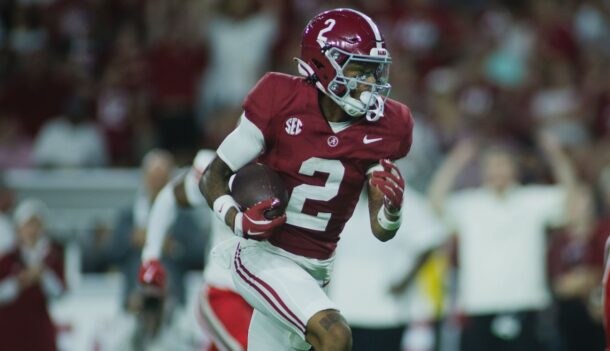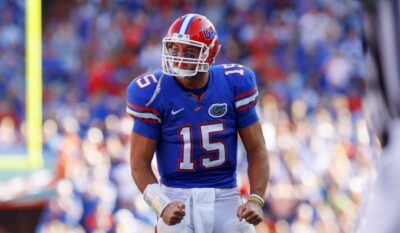TUSCALOOSA, Ala. _ When the University of Alabama football program had to submit its requests to the NFL’s advisory board for 2014 draft grades so underclassmen would have a better idea if they should consider leaving school early, it would have been impossible for Nick Saban to stuff them all into a single envelope.
The Crimson Tide had paperwork for 11 players – yes, essentially half of the starters – including wide receiver DeAndrew White.
“It was pretty tough,” White said about his decision to stay at the Capstone. “I didn’t know what to do. I sat down with my family and Coach Saban. He told me (staying) was the right thing to do, so it was my best decision.”
White was fourth in team receiving as a junior, with 32 catches for 534 yards and four touchdowns, while making eight starts. He was also playing with a broken bone in his foot that would require surgery in January.
Needless to say, White’s draft grade probably wasn’t that high. Kevin Norwood, who led the Crimson Tide with 45 receptions for 736 yards and didn’t have a significant injury, still lasted until the fourth round.
“My philosophy is, look, I’m not disappointed in any players,” Saban explained at SEC Media Days. “When they make the decision to go do what they’re going to do we’re 100 percent supportive of them and we want to see them do well. That benefits them, it benefits us. It’s what we’re all about, all right?
“But we do try to give them good advice when it comes to making a business decision about their football career.”
Consequently, Saban got a jump on it this year by having NFL executive vice president of football operations Troy Vincent, who oversees college relations for the league office, as one his feature speakers for training camp.
“He gave us numbers and facts about the percentages of you staying on a team long-term and not, and the importance of you staying and getting your degree — that can benefit you after football,” senior safety Nick Perry said about Vincent, who has spent 22 years as an NFL player and executive.
“Something that stuck with me a little bit: ‘Know what I can be, but what I can see,’” Saban said about Vincent’s presentation Monday night. “It’s about the vision of what you have for what you want to accomplish and what you want to do, and the commitment you’re willing to make to the things you need to do to be able to do it.”
Saban’s policy regarding early departures has never waivered. Players who are projected to be first-round selections get his blessing, while he encourages everyone else to stay in school, get a degree and improve his draft stock.
But for the fourth straight draft a record number of players tried to make the jump to the NFL before their eligibility expired. Specifically, there were 98, 102 if you count the four who already had their degrees.
Of them, 38 went undrafted.
“What people don’t look at is if you’re going to be a fifth‑ or six‑round draft pick, they go out early so they get to a second contract faster,” Saban explained. “There’s only a 25 percent chance you’re going to get a second contract. Your chances of making the team are not nearly as good as a first‑, second‑, or third‑round draft pick.
“If you stayed in school, you’d have a much better chance of becoming one of those guys by improving, developing and playing more rather than taking that gamble and that risk that you will be able to sustain a career by being not a high draft pick.”
Alabama’s top pick in May was linebacker C.J. Mosley, who probably would have been a low first-round selection a year ago but opted to return for his senior year. He won the Butkus Award as the nation’s best linebacker and was the 17th pick in the draft by the Baltimore Ravens, resulting in a four-year contract for $8.78 million guaranteed, including a $4.71 million signing bonus.
Among those who decided not to come back for a final year included safety Ha Ha Clinton-Dix, linebacker Adrian Hubbard, tackle Cyrus Kouandjio, defensive lineman Jeoffrey Pagan and safety Vinnie Sunseri.
Among them only Clinton-Dix went in the first round, 21st overall to Green Bay, where this week he’s listed second on the depth chart at free safety. Kouandjio was a second-round selection, Sunseri went in the fifth, Pagan in the sixth, and Hubbard went undrafted.
Ironically, Hubbard was the only one among them to already have his degree.
While the NFL continues to wrestle with the issue, and Saban’s already disclosed that two of the proposals under consideration are to limit programs to five junior grades or to only give grades of first round, second round or a stay in school, he’s trying to get in front of the issue.
White said there wasn’t a single determining factor in his decision, and Trey DePriest made a similar resolution to stay for a final year. Meanwhile, even the players who were drafted are now competing for jobs and if they don’t make the final 53-man rosters will be nothing short of unemployed.
“They’re not in the draft next year,” Saban said. “They’re not playing college football either.”
Christopher Walsh has covered Alabama football since 2004 and is the author of 19 books. In his free time, he writes about college football.







